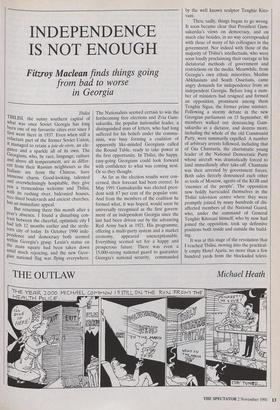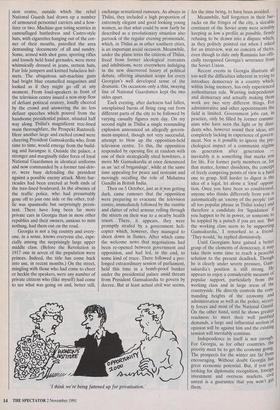INDEPENDENCE IS NOT ENOUGH
Fitzroy Maclean finds things going from bad to worse in Georgia
Tbilisi T13ILISI, the sunny southern capital of What was once Soviet Georgia has long been one of my favourite cities ever since I first went there in 1937. Even when still a reluctant part of the former Soviet Union, it managed to retain a joie-de-vivre, an ele- gance and a sparkle all of its own. The Georgians, who, by race, language, culture and above all temperament, are as differ- ent from their Russian neighbours as the Italians are from the Chinese, have Immense charm. Good-looking, talented and overwhelmingly hospitable, they give You a tremendous welcome and Tbilisi, With its rushing river, balconied houses, tree-lined boulevards and ancient churches, has an immediate appeal. But returning there this month after a Year's absence, I found a disturbing con- trast between the cheerful, optimistic city I had left 12 months earlier and the strife- torn city of today. In October 1990 inde- Pendence and democracy both seemed Within Georgia's grasp. Lenin's statue on the. main square had been taken down amid much rejoicing, and the new Geor- gian national flag was flying everywhere.
The Nationalists seemed certain to win the forthcoming free elections and Zvia Gam- sakurdia, the popular nationalist leader, a distinguished man of letters, who had long suffered for his beliefs under the commu- nists, was busy forming a coalition of apparently like-minded Georgians called the Round Table, ready to take power at the first opportunity. In Tbilisi, the happy, easy-going Georgians could look forward with confidence to what was coming next. Or so they thought.
As far as the election results were con- cerned, their forecast had been correct. In May 1991 Gamsakurdia was elected presi- dent with 87 per cent of the popular vote. And from the members of the coalition he formed what, it was hoped, would soon be universally recognised as the first govern- ment of an independent Georgia since the last had been driven out by the advancing Red Army back in 1921. His programme, offering a multi-party system and a market economy, appeared unexceptionable. Everything seemed set for a happy and prosperous future. There was even a 15,000-strong national guard to guarantee Georgia's national security, commanded by the well known sculptor Tenghiz Kito- vani.
Then, sadly, things began to go wrong. It soon became clear that President Gam- sakurdia's views on democracy, and on much else besides, in no way corresponded with those of many of his colleagues in the government. Nor indeed with those of the majority of Tbilisi's intellectuals, who were soon loudly proclaiming their outrage at his dictatorial methods of government and restrictions on the media. Meanwhile, from Georgia's own ethnic minorities, Muslim Abkhasians and South Ossetians, came angry demands for independence from an independent Georgia. Before long a num- ber of ministers had resigned and formed an opposition, prominent among them Tenghiz Sigua, the former prime minister. Following a stormy debate in the new Georgian parliament on 15 September, 40 members walked out denouncing Gam- sakurdia as a dictator, and dozens more, including the whole of the old Communist Party, were summarily expelled. A number of arbitrary arrests followed, including that of Gia Chanturia, the charismatic young leader of the National Democratic Party whose aircraft was dramatically forced to land immediately after take-off. Chanturia was then arrested by government forces. Both sides fiercely denounced each other as tools of Moscow, agents of the KGB and 'enemies of the people'. The opposition now boldly barricaded themselves in the Tbilisi television centre where they were promptly joined by many hundreds of dis- affected members of the National Guard, who, under the command of General Tenghiz ICitovani himself, who by now had joined the opposition, took up defensive positions both inside and outside the build- ing.
It was at this stage of the revolution that I reached Tbilisi, moving into the practical- ly empty Hotel Ajaria, no more than a few hundred yards from the blockaded televi-
sion centre, outside which the rebel National Guards had drawn up a number of armoured personnel carriers and a how- itzer or two. Machine-gun toting sentries in camouflaged battledress and Castro-style hats, with cigarettes hanging out of the cor- ner of their mouths, patrolled the area demanding 'documents' of all and sundry. Some, armed with shot guns, sporting rifles and loosely held hand grenades, were more whimsically dressed in jeans, stetson hats, Fair Isle jumpers and knitted balaclava hel- mets. The ubiquitous sub-machine guns had bright blue enamelled magazines and looked as if they might go off at any moment. From loud-speakers in front of the television centre issued a non-stop flow of defiant political oratory, loudly cheered by the crowd and answering the no less defiant speeches which poured from the handsome presidential palace, situated half way along Tbilisi's magnificent tree-lined main thoroughfare, the Prospekt Rustaveli. Here another large and excited crowd were cheering President Gamsakurdia who, from time to time, would emerge from the build- ing and harangue it. Outside the palace, a stronger and marginally tidier force of loyal National Guardsmen in identical uniforms and now commanded by a former taxi-driv- er, were busy defending the president against a possible enemy attack. More bar- ricades had been erected at both ends of the tree-lined boulevard. In the absence of the traffic police, who had presumably gone off to join one side or the other, traf- fic was spasmodic but surprisingly persis- tent. There have long been far more private cars in Georgia than in most other republics and their owners, anxious to miss nothing, had them out on the road.
Georgia is not a big country and every- one, in a sense, knows everyone else, espe- cially among the surprisingly large upper middle class. (Before the Revolution in 1917 one in seven of the population were princes. Indeed, the title has come back into use, in recent months.) On the street, mingling with those who had come to cheer or heckle the speakers, were any number of private citizens who (like myself) had come to see what was going on and, better still, exchange sensational rumours. As always in Tbilisi, they included a high proportion of extremely elegant and good looking young women, so that what could by now fairly be described as a revolutionary situation also partook of the regular evening promenade, which, in Tbilisi as in other southern cities, is an important social occasion. Meanwhile, under the plane trees the citizens of Tbilisi, freed from former ideological restraints and inhibitions, were everywhere indulging in the new discovered luxury of political debate, offering abundant scope for every Georgian's well developed sense of the dramatic. On occasions only a thin, swaying line of National Guardsmen kept the two sides apart.
Each evening, after darkness had fallen, unexplained bursts of firing rang out from different parts of the city to be followed by varying casualty figures next day. On my second night in Tbilisi a single resounding explosion announced an allegedly govern- ment-inspired, though not very successful, attempt to blow up the opposition-held television centre. To this, the opposition responded by opening fire at random with one of their strategically sited howitzers, a move Mr Gamsakurdia at once denounced as an 'act of brigandage', while at the same time appealing for peace and restraint and movingly recalling the role of Mahatma Gandhi in British India.
Then on 5 October, just as it (was getting dark, came rumours that the opposition were preparing to evacuate the television centre, immediately followed by the rumble and clatter of rebel armour rolling through the streets on their way to a nearby health resort. There, it appears, they were promptly strafed by a government heli- copter which, however, they managed to shoot down in flames. After which came the welcome news that negotiations had been re-opened between government and opposition, and had led, in the end, to some kind of truce. There followed a pro- longed extraordinary session of parliament, held this time in a bomb-proof bunker under the presidential palace amid threats from President Gamsakurdia to govern by decree. But at least actual civil war seems, think we're being fattened up for privatisation.'
for the time being, to have been avoided.
Meanwhile, half forgotten in their bar- racks on the fringes of the city, a sizeable continent of the Soviet army were sensibly keeping as low a profile as possible, firmly refusing to be drawn into a dispute which, as they politely pointed out when I asked for an interview, was no concern of theirs, even though to date only Rumania has offi- cially recognised Georgia's severance from the Soviet Union.
Recent events in Georgia illustrate all too well the difficulties inherent in trying to introduce democracy in a country which, within living memory, has only experienced authoritarian rule. Wanting independence and democracy and actually making them work are two very different things. For administrative and other appointments the field is limited. Government jobs can, in practice, only be filled by former commu- nists who have seen the light or by dissi- dents who, however sound their ideas, are completely lacking in experience of govern- ment. Nor is it possible to ignore the psy- chological impact of a communist regime on generation after generation — inevitably it is something that marks you for life. For former party members or, for that matter, former dissidents, the concept of freely competing points of view is a hard one to grasp. Still harder to digest is the idea of a legal, let alone a 'loyal' opposi- tion. Once you have been so conditioned, anyone who thinks differently from you is automatically an 'enemy of the people' (an all too popular phrase in Tbilisi today) and therefore a candidate for 'liquidation' if you happen to be in power, or someone to be toppled by a putsch if you are not. 'Bur the working class seem to be supporting Gamsakurdia,' I remarked to a friend. 'They would,' he replied dismissively. Until Georgians have gained a better grasp of the elements of democracy, it may take them some time to reach a peaceful solution to the present deadlock. Though he is clearly under severe pressure, Gain- sakurdia's position is still strong. He appears to enjoy a considerable measure of popular support, particularly from the working class and in large areas of the countryside. He directly controls the com- manding heights of the economy and administration as well as the police, securi- ty forces and most of the National Guard. On the other hand, until he shows greater readiness to meet their well justified demands, a large and influential section. of opinion will be against him and the existing tension will inevitably continue. Independence in itself is not enough. For Georgia, as for other countries, the priority must be to get the economy going. The prospects for the winter are far from encouraging. Without doubt Georgia has great economic potential. But, if you are looking for diplomatic recognition, foreign, investment and overseas markets, CiVJ unrest is a guarantee that you won't get them.



































































 Previous page
Previous page